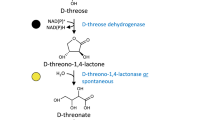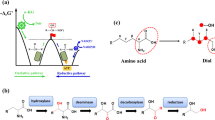Abstract.
Biological oxidation of cyclic alkanes and cyclic alcohols normally results in formation of the corresponding dicarboxylic acids, which are further metabolized in the cell. The biochemical pathways for oxidative conversion of cyclic compounds are similar in various phylogenetically diverse bacteria. Significant progress has been made in the past 2 years in the isolation and characterization of genes involved in cyclic alkane oxidation pathways in several bacterial species. In this article, we review recent advancements in the field of cyclic alcohol oxidation with focus on the biochemical and genetic characterization of the gene functions. Phylogenetic relationships of the analogous enzymes in the pathways are analyzed. Potential biocatalysis applications of these enzymes are also discussed.
Similar content being viewed by others
Author information
Authors and Affiliations
Additional information
Electronic Publication
Rights and permissions
About this article
Cite this article
Cheng, .Q., Thomas, .S. & Rouvière, .P. Biological conversion of cyclic alkanes and cyclic alcohols into dicarboxylic acids: biochemical and molecular basis. Appl Microbiol Biotechnol 58, 704–711 (2002). https://doi.org/10.1007/s00253-002-0958-z
Received:
Revised:
Accepted:
Issue Date:
DOI: https://doi.org/10.1007/s00253-002-0958-z




